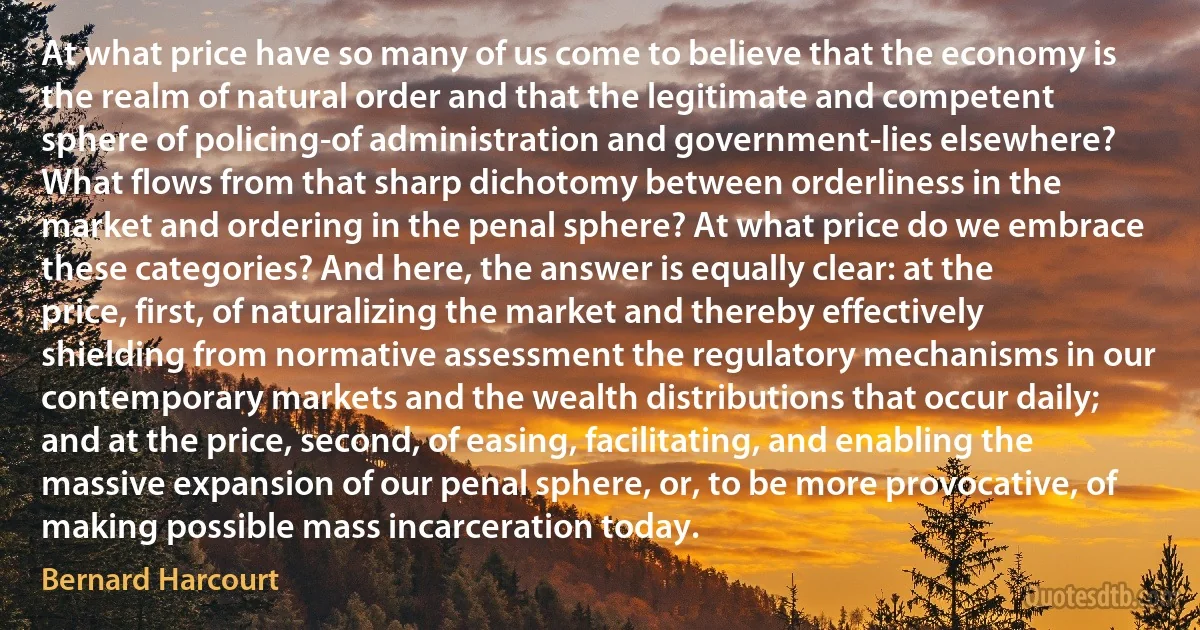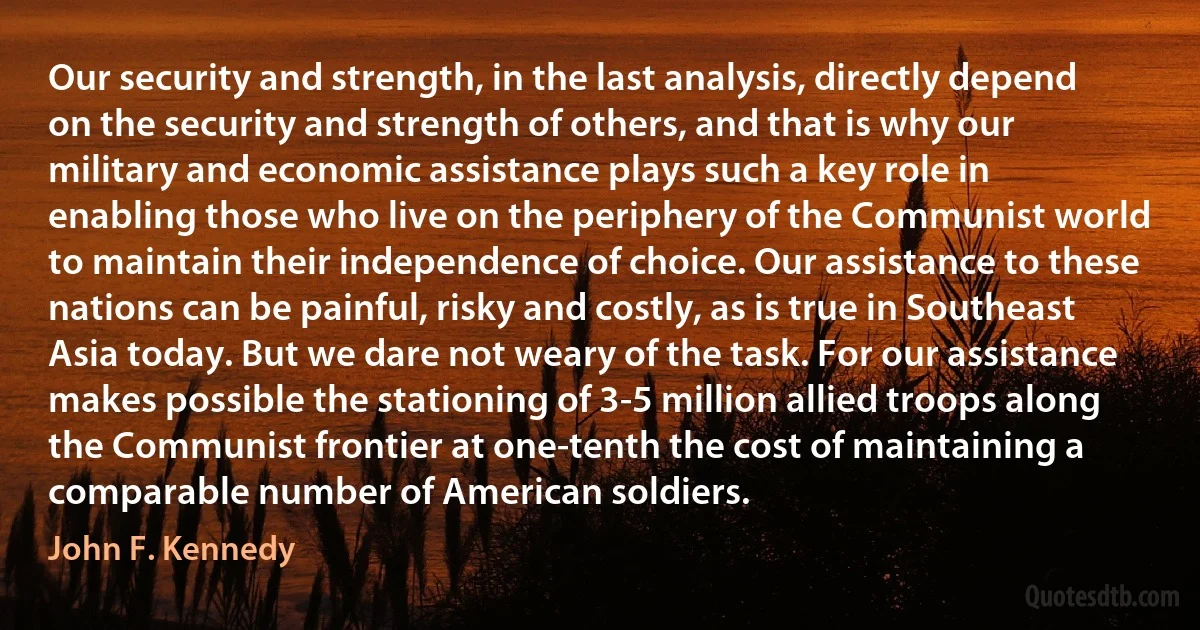Enabling Quotes - page 5
Instead of enabling humans to improve their lot, science degrades the natural environment in which humans must live. Instead of enabling death to be overcome, it produces ever more powerful technologies of mass destruction. None of this is the fault of science; what it shows is that science is not sorcery. The growth of knowledge enlarges what humans can do. It cannot reprieve them from being what they are.

John N. Gray
But she's your daughter!” "You think I don't know that?” Donna Mitchell's dark eyes, so like Allison't own, drilled into her. "But I don't do her any favors if I keep enabling her. I'm not going to rescue Lindsay from the consequences of her own self-destructive behavior anymore. The last time she was here, I told her if she left that was it. And she still did.

Lis Wiehl
Under these circumstances, men lose sight of themselves and escape into the security of work or sociability or other forms of what Vidich and Bensman have called the "externalization of the self.” Vidich and Bensman sketch a troubling picture of such men: "What is left of the personality is the dulled, autonomic ritualization of behavior where ... no disturbing interferences are allowed to enter into thought. ... Personal and social life becomes barren, and the personal mechanics and daily routine of living become the end-all of existence. All types of activity whose operation is based upon an objective, external, automatic rhythm to which an individual can bend himself serve the function of enabling him to lose himself in an objective ceremony.”.

Benjamin Barber
Spirit, on the contrary, may be defined as that which has its center in itself. It has not a unity outside itself, but has already found it; it exists in and with itself. Matter has its essence out of itself; Spirit is self-contained existence (Bei-sich-selbst-seyn). Now this is Freedom, exactly. For if I am dependent, my being is referred to something else which I am not; I cannot exist independently of something external. I am free, on the contrary, when my existence depends upon myself. This self-contained existence of Spirit is none other than self-consciousness consciousness of one's own being. Two things must be distinguished in consciousness; first, the fact that I know; secondly, what I know. In self-consciousness these are merged in one; for Spirit knows itself. It involves an appreciation of its own nature, as also an energy enabling it to realise itself; to make itself actually that which it is potentially.

Georg Wilhelm Friedrich Hegel
Leadership is about setting a direction. It's about creating a vision, empowering and inspiring people to want to achieve the vision, and enabling them to do so with energy and speed through an effective strategy. In its most basic sense, leadership is about mobilizing a group of people to jump into a better future.

John Kotter
And so Benet's opening description of Daniel Webster might have foretold Arizona U.S. senator John McCain, who fashioned himself a would-be president, once adored for his anti-establishmentarian streak and revered for his personal Vietnam War POW sacrifices. John McCain could have been Daniel Webster in dissuading misguided Americans from electing a fraudulent, dissembling, and America-loathing Barack Obama. Instead, John McCain ran an inept, cowardly, and deliberately underwhelming presidential campaign in 2008. McCain was AWOL on the campaign stump just eight weeks before election day. He squandered a respectable résumé, settling for a historical annotation as a ballot placeholder, enabling eight years of progressive and race-hustling hell. John McCain, unwilling to confront Barack Obama's elaborate deceptions and racial animus, surrendering to the nation's infatuation with identity politics, was scorned and rejected, shunted aside for a darling nobody.

John McCain
The picture I have painted today may have seemed somewhat grim. Let me conclude by telling you why I have hope.
I have hope because the positive aspects of globalization are enabling nations and peoples to become politically, economically and socially interdependent, making war an increasingly unacceptable option.
Among the 25 members of the European Union, the degree of economic and socio-political dependencies has made the prospect of the use of force to resolve differences almost absurd. The same is emerging with regard to the Organization for Security and Co-operation in Europe, with some 55 member countries from Europe, Central Asia and North America. Could these models be expanded to a world model, through the same creative multilateral engagement and active international cooperation, where the strong are just and the weak secure?

Mohamed ElBaradei
Physiologically, man in the normal use of technology (or his variously extended body) is perpetually modified by it and in turn finds ever new ways of modifying his technology. Man becomes, as it were, the sex organs of the machine world, as the bee of the plant world, enabling it to fecundate and to evolve ever new forms. The machine world reciprocates man's love by expediting his wishes and desires, namely, in providing him with wealth. One of the merits of motivation research has been the revelation of man's sex relation to the motorcar.

Marshall McLuhan
I have a very one-track mind that needs to concentrate. I asked myself which issue is more important: whether mental states are more left- or right-hemispheric, or whether they are causal in brain function. From weighing the pros and cons, I decided that the left-brain, right-brain work was well in orbit and that it would be more important to shift my primary focus to consciousness.
The mind-brain issues are intrinsically more compelling. They carry strong humanistic as well as scientific implications. I could foresee changes in our world view, guiding beliefs, and social values. In the context of today's worsening world conditions and our imperiled future, this work seemed far more important than whether you can find a brain theory enabling people to learn faster, draw better, make better medical diagnoses, and so on.
We're beginning to learn the hard way that today's global ills are not cured by more and more science and technology.

Roger Wolcott Sperry
Varma adapted Western realism to pioneer a new movement in Indian art. In 1894 he set up a lithographic press in order to mass-produce copies of his paintings as oleographs, enabling ordinary people to afford them. That innovation resulted in the tremendous popularity of his images, which became an integral part of popular Indian culture thereafter.

Raja Ravi Varma
Another miraculous result of playing Scully has been all the incredible young women I have been blessed to meet along the way--women who have shared that they have received strength from Scully, that because of Scully's strength they have been afraid but done it anyway. These have been women from all walks of life: women from low-income neighborhoods who have persevered despite all odds to study hard and pursue their dreams, enabling them to enter into better schools and work environments; women who have illness and physical challenges who have gotten better and stronger because they believe they can. I truly believe that we can overcome any hurdle that lies before us and create the life we want to live. I have seen it happen time and time again.

Gillian Anderson
There is a temptation to turn away from and ignore this mass suffering and cruelty because it's so painful to confront, so much more pleasant to remain unaware of it. Animal rights activists are determined to prevent us from doing so, and we should all feel gratitude for their increasing success in making us see what we are enabling when we consume the products of this barbaric and sociopathic industry.

Glenn Greenwald
What is the "extraordinary"? It is the love of Jesus Christ himself, love that goes to the cross in suffering obedience. It is the cross. The peculiar feature of Christian life is precisely this cross, a cross enabling Christians to go beyond the world, as it were, thereby granting them victory over the world. Suffering encountered in the love of the one who is crucified - that is the "extraordinary" in Christian existence.
The Extraordinary is without doubt that visible element over which the Father in heaven is praised. It cannot remain hidden; people must see it.

Dietrich Bonhoeffer
Bacon in his instruction tells us that the scientific student ought not to be as the ant, who gathers merely, nor as the spider who spins from her own bowels, but rather as the bee who both gathers and produces. All this is true of the teaching afforded by any part of physical science. Electricity is often called wonderful, beautiful; but it is so only in common with the other forces of nature. The beauty of electricity or of any other force is not that the power is mysterious, and unexpected, touching every sense at unawares in turn, but that it is under law, and that the taught intellect can even now govern it largely. The human mind is placed above, and not beneath it, and it is in such a point of view that the mental education afforded by science is rendered super-eminent in dignity, in practical application and utility; for by enabling the mind to apply the natural power through law, it conveys the gifts of God to man.

Michael Faraday



